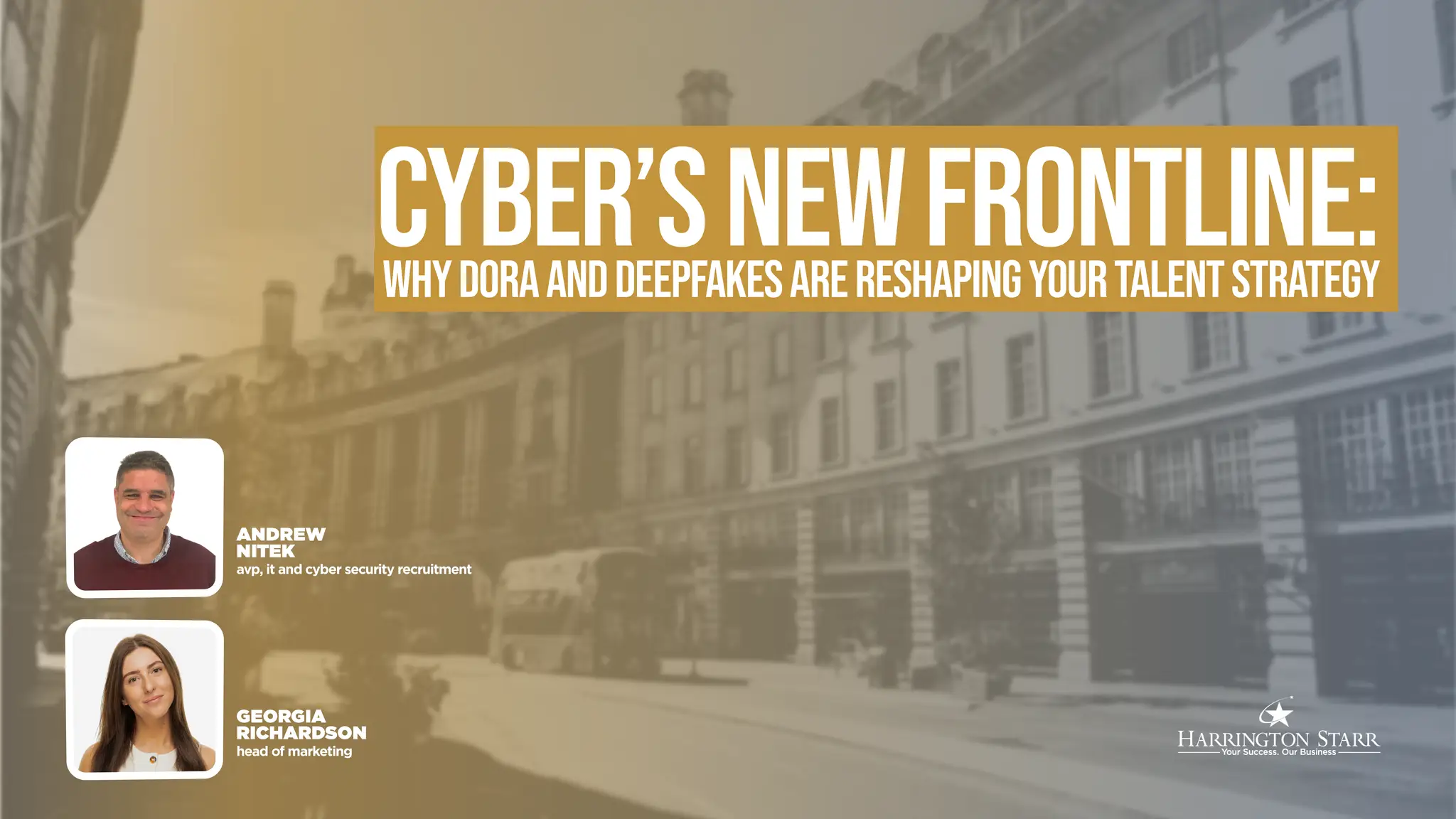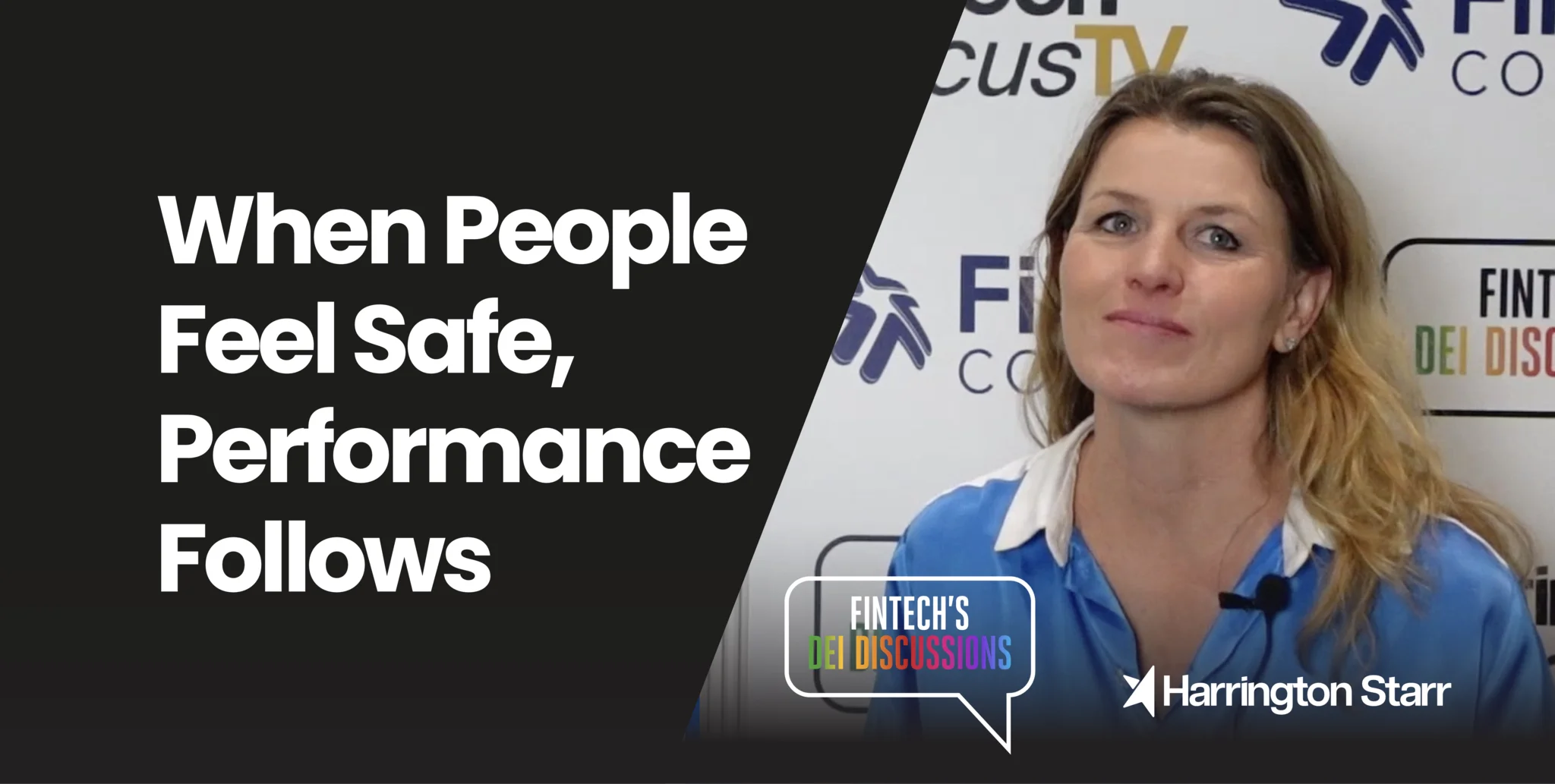In a world where technology evolves faster than regulation, cyber leaders are waking up to a new reality: you can’t automate your way out of emerging risk.
From Europe’s DORA deadlines to the rise of AI-generated deepfakes and synthetic threats, cybersecurity and IT risk in 2025 is less about controls and more about capability. The capability of your people.
This isn’t just about hiring more engineers. It’s about building a team that can respond to untested threats, interpret regulatory nuance, and explain risk in boardrooms that no longer accept silence as a defence.
This is your guide to what’s coming and who you’ll need on your team to survive it.
DORA Isn’t Just a Regulation
The Digital Operational Resilience Act (DORA) came into force in January 2025, with full compliance expected by 2025-2026. If you’re in Financial Services or a FinTech-adjacent firm operating in the EU, you’re already on the hook.
But here’s what many businesses miss: DORA isn’t just a framework for compliance. It’s a framework that exposes whether your team is capable of operational resilience under stress.
Key requirements like:
- Threat-led penetration testing (TLPT)
- ICT risk management frameworks
- Incident response protocols
- Third-party monitoring and exit strategies
...aren’t simply box-ticking exercises. They require specialist human insight.
And not every security engineer, risk analyst, or compliance officer is ready.
Is Your Team Built for Breach Simulation, or Still Playing Defence?
DORA’s most controversial requirement? Advanced testing under real-world threat conditions.
That’s a different muscle from your standard risk register.
The best-prepared firms are:
- Recruiting TLPT specialists
- Hiring contractors to conduct red team testing
- Training internal cyber teams to respond like it’s not a drill
If your current team has never run a simulation involving multi-vendor failure or real-time third-party compromise, you’re likely underprepared.
And under-resourced.
Deepfakes, Synthetic Fraud & AI Attacks: Do You Have the Right People Watching?
In 2024 alone, AI-generated scams increased 320%. That number is rising faster than most companies' ability to respond.
Deepfakes are no longer a novelty, they’re part of advanced phishing campaigns targeting C-level leaders. Synthetic identities are being used to fool KYC protocols. AI-driven deception is creating false vendor credentials and even manipulating customer service chat logs.
Detection is not just a technical challenge. It’s a talent challenge.
The new hiring frontier includes:
- AI threat modelling specialists
- Behavioural detection analysts
- Risk professionals who understand how generative AI works
If you don’t have those people in your pipeline, your platform isn’t just vulnerable. It’s exposed.
Why FinTech Boards Are Waking Up to the Hiring Gap in Cyber
Cyber risk has officially entered the boardroom.
In both the UK and US, financial regulators are starting to hold senior leaders directly accountable for security failures. The SEC’s new cyber disclosure rules require material breaches to be reported within four days. The FCA’s Operational Resilience rules have increased scrutiny on how firms handle disruption.
Boards are asking:
- Who’s responsible?
- What’s our exposure?
- Do we have the right team?
And if the answers aren’t clear, the next budget meeting usually involves hiring.
The Cost of Compliance Isn’t Just Fines, It’s Hiring Late
Firms that leave hiring until an audit is looming pay more. In both cost and reputation.
We’ve seen FinTechs forced to:
- Delay market launches because of failed readiness assessments
- Pull in expensive contractors at short notice
- Rewrite entire incident response playbooks weeks before a regulator visit
In contrast, firms that hire proactively are more likely to:
- Attract top talent (before the frenzy)
- Build true resilience, not just reactive capacity
- Turn compliance into a commercial differentiator
You Don’t Need More Tech, You Need People Who Understand Risk
In an industry obsessed with tooling, this is your reminder: tools are only as good as the people using them.
The best teams we see aren’t the ones with the biggest SIEM budget. They’re the ones with:
- Cyber leads who can translate risk for the CFO
- GRC managers who know the audit questions before they’re asked
- Engineers who challenge default settings, not just deploy controls
And critically, they’re teams that understand the business of FinTech. Because risk in this sector is not just technical, it’s transactional, reputational, and existential.
The Soft Skills Defining Tomorrow’s Cyber Leaders
In an era where tech evolves daily, soft skills are the underrated differentiator.
Resilience, adaptability, communication, and critical thinking are becoming just as vital as any technical certification.
Why?
Because today’s cyber professionals don’t just interact with code. They collaborate across functions, educate internal stakeholders, negotiate with vendors, and often become the face of the firm during times of crisis.
Key soft skills we’re seeing top-tier firms prioritise:
Executive communication: Can your cyber lead explain risk to non-technical stakeholders in under 2 minutes?
Decision-making under pressure: In breach simulation or audit failure, who keeps a cool head?
Strategic thinking: Does your GRC manager only react, or do they forecast?
Empathy and coaching: Can your team develop junior analysts while raising standards?
These are the qualities that define teams who don’t just comply, they lead.
From Contractors to CTEM: How Smart Firms Are Hiring for Resilience
Resilience doesn’t come from headcount. It comes from capability.
We’re seeing FinTech firms across London, New York, and Europe build hybrid hiring models that include:
- Permanent staff focused on risk ownership and strategic planning
- Contractors brought in for TLPT, remediation, or urgent audit prep
- CTEM-aligned specialists who can continuously test and adapt security posture
This flexible approach isn’t about saving money. It’s about staying ahead of threats that don’t follow budget cycles.
Is Your Cyber Team Future-Ready, or Just Audit-Ready?
Audit-ready teams can survive a week of questions. Future-ready teams can survive a crisis.
What’s the difference?
- Audit-ready means documented processes. Future-ready means tested ones.
- Audit-ready means passing compliance. Future-ready means passing the real-world test.
- Hiring for one doesn’t guarantee the other.
What You Can Learn from a Breach (Even If It’s Not Yours)
The best cyber teams don’t just learn from internal incidents, they learn from others’ mistakes.
Case studies from the past 12 months show a common theme:
- Delayed breach disclosure = reputational damage
- Lack of third-party vendor visibility = exploit
- Incomplete IAM protocols = unauthorised access
- No incident rehearsal = total chaos during real-time attacks
Use these patterns as interview filters:
“How do you stay informed on breaches across the sector?”
“What would you have done differently if you were in charge of [recent company X] breach?”
“When did you last test your incident response plan?”
It’s not about being perfect. It’s about being prepared.
What Top Cyber Employees Want (And Why They’re Avoiding You)
You’re not just competing on salary.
Today’s top cyber and risk professionals are looking for:
- Work that matters (not just checkbox compliance)
- Teams that listen to security (not sideline it)
- Investment in tools and people
- Clarity around the scope of ownership
If your job specs are still three pages of acronyms and no mention of purpose, they’re scrolling past.
The Global Hiring Gap: UK vs US vs EU Responses to Cyber Risk
While the threat landscape is global, the talent strategy is not.
UK FinTechs are doubling down on audit-readiness, particularly for FCA Operational Resilience. We’re seeing increased demand for hybrid GRC/technical roles that can operate across departments.
US firms, particularly in New York and Silicon Valley, are prioritising breach response over prevention. Hiring is skewed towards contractors, with high day rates for red teamers and breach remediation experts.
EU-based organisations are hiring for DORA compliance and looking beyond local talent due to shortages in regulatory expertise. Cross-border hiring is rising, particularly from the UK and Nordics.
Your competitors are already making moves. Are you?
The Hidden Risk in Your Tech Stack: Talent Attrition
Even with the best platforms in place, losing one or two key people can compromise your entire cyber posture.
We’ve seen:
- Security platforms go unmonitored for weeks after a resignation
- GRC gaps emerge because documentation lived in someone’s head
- Key audit prep delayed because the only experienced contractor wasn’t renewed
If you don’t have continuity plans for your people, your tech becomes a ticking time bomb.
Make sure your business continuity plan includes:
- Succession mapping for security-critical roles
- Cross-training and shadowing programmes
- Clear documentation protocols that outlive personnel
How AI Is Reshaping the Role of the CISO
CISOs in 2025 aren’t just technologists. They’re storytellers, translators, and strategic advisors.
As AI-generated threats become more complex, the CISO role is expanding to include:
- Explaining probabilistic risk to non-technical boards
- Aligning AI threat modelling with business continuity plans
- Defining ethics and AI usage boundaries within cyber protocols
Firms that fail to hire or upskill CISOs in these areas may struggle not only with threats but also with leadership credibility.
Hiring Right Is Your Last Competitive Advantage in Cyber
Regulations can be copied. Tech can be bought. But the right team? That takes time, network, and insight.
And in an industry moving at cyber speed, your ability to hire the right people before your competitors do might be the only edge left.
How Harrington Starr Helps FinTechs Hire for Resilience
At Harrington Starr, we specialise in placing high-impact cyber and risk professionals across London, New York, Belfast and Europe.
Our clients don’t come to us for CVs. They come to us because:
- We know what DORA-readiness looks like
- We understand the roles that don’t exist on job boards yet
- We have access to contractors who’ve run breach simulations and passed audits under pressure
- We help you plan beyond the panic hire
If your cyber strategy depends on people, not just platforms, we should talk.
Want to benchmark your current team against today’s cyber risks?
Start a conversation with our Cyber & Risk talent team today.








